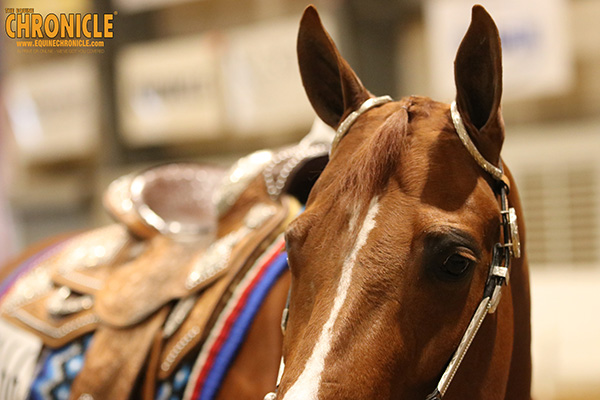Is Your Horse Stressed?

Boehringer Ingelheim Animal Health
Horse owners are often busy people who find themselves stressed for multiple reasons. While horses may not have a high-pressure job or have to care for children or worry about balancing a checkbook, they too can suffer from stress.
As in humans, some stress is natural for horses, but too much stress can be detrimental to horse’s health and well-being. Horses are creatures of habit and excel in a consistent environment. When sudden changes are made, this can cause stress. Stress can affect horses in many ways, including weight loss, weakened immune system or, even worse, gastric ulcers.
Understanding the Hidden Elements and Types of Equine Stress
Time to set aside our personal worries for a moment and focus on decreasing our horse’s stress levels. Horses often experience stress when unexpected or sudden changes happen in their day-to-day activities.
Horses don’t always make it easy for their owners to identify when they are stressed. Some horses can handle stress and change better than others, just like humans. It is important to keep a close eye on each horse and understand their different personalities and recognize that they might express stress differently.
Horses are also known for stoicism, which can be considered a natural instinct. Flipping back in our history books, horses were afraid to look unwell in front of predators and avoided showing any signs of a mental or physical disadvantage. Horses still use that same instinct to hide joint pain, which can cause stress. Research has shown that 47% of the sports-horse population may be lame during normal work and riding, but owners and trainers do not notice or recognize lameness.1
Horses can suffer from two types of stress: acute and chronic. Acute stress is known as short-term stress. Examples of acute stress in horses include:
- Spooking at a moving object
- Anxiety when loading into a trailer
- A behavioral change during a medical procedure (short pain)
Chronic stress is long-term stress, which is more commonly found in an environment or lifestyle change. Examples of chronic stress in horses include:
- Feeding schedule adjustment
- Being moved from a pasture to stalling
- Losing a companion
Watching for a Stressed Horse
All horses are different, but there are three common types of changes horse owners need to be watching for and evaluating in their horses to see if they are showing signs of stress.
- Behavioral changes: yawning, poor attitude, tooth grinding and stall pacing
- Physical changes: trembling, sweating, elevated pulse, weight loss, diarrhea and frequent urination
- Internal changes: gastric ulcers and weakened immune system
Providing Well-Being Solutions to Your Equine Friend
Naturally, horse owners cannot prevent all stressors, but they can take steps to help reduce the opportunity for their horse to become stressed. This includes managing environmental settings and staying consistent in training, feeding, and visiting times.
Evaluate your horse’s living arrangement to make sure any objects are not spooking the horse, feed on a consistent and timely basis, practice and train at a routine time, and be cognizant of the other animals and horses that share the same barn.
Enrichment activities have been found to help reduce a horse’s stress levels and prevent boredom during the day. A recent study showed that over 12 weeks, an enriched environment combined with inanimate and social stimuli had beneficial effects on horses in terms of learning ability, personality traits, and general well- being.2 Enrichment activities can include keeping a ball within the stall, a treat dispenser or other fun and safe devices to keep your horse entertained.
If a horse owner is concerned their horse may be overly stressed, talk to your veterinarian. In some situations, not all environment and scheduling changes are realistic, and a horse may still suffer from stress and its associated health implications. Luckily, there are other preventive health care solutions to help keep a horse’s stress from turning into gastric ulcers. To prevent harmful side effects such as gastric ulcers from stress, an over-the-counter option is Ulcergard® (omeprazole) oral paste, which helps reduce the creation of acid in a horse’s stomach and maintain optimal gastric health.
Taking time to bring awareness to your horse’s well-being is the first step to providing a healthier life, both mentally and physically, for your equine friends. To learn more about managing equine stress, talk to your local veterinarian.
ULCERGARD IMPORTANT SAFETY INFORMATION: ULCERGARD can be used in horses that weigh at least 600 lbs. Safety in pregnant mares has not been determined. Not for use in humans. Keep this and all medications out of the reach of children. In case of ingestion, contact a physician.
ULCERGARD® is a registered trademark of Boehringer Ingelheim Animal Health USA Inc. ©2021 Boehringer Ingelheim Animal Health USA Inc., Duluth, GA. All rights reserved. US-EQU-0134-2021
1 Dyson, S., Berger, J., Ellis, A., & Mullard, J. (2017, November 01). Development of an ethogram for a pain scoring system in ridden horses and its application to determine the presence of musculoskeletal pain. Retrieved March 30, 2021, from https://www.sciencedirect.com/science/article/abs/pii/S1558787817301727?via%253Dihub
2 Lansade, L., Valenchon, M., Foury, A., Neveux, C., Cole, S., Layé, S., . . . Moisan, M. (2014, December 10). Behavioral and Transcriptomic fingerprints of an enriched environment in horses (equus caballus). Retrieved March 30, 2021, from https://journals.plos.org/plosone/article?id=10.1371%2Fjournal.pone.0114384#pone.0114384-Fox1










